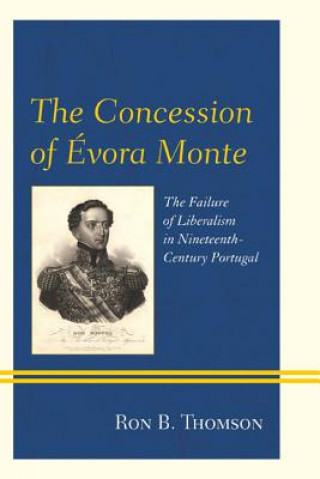
Kód: 05073692
Concession of Evora Monte
Autor Ronald B. Thomson
In a period when the monarch was the key figure in the Portuguese government, the struggle for the throne among members of the royal family was of crucial significance. Against a backdrop of new liberal ideas, economic conservatis ... celý popis
- Jazyk:
 Angličtina
Angličtina - Väzba: Pevná
- Počet strán: 186
Nakladateľ: Lexington Books, 2014
- Viac informácií o knihe

128.30 €
Dostupnosť:
50 % šanca Máme informáciu, že by titul mohol byť dostupný. Na základe vašej objednávky sa ho pokúsime do 6 týždňov zabezpečiť.
Máme informáciu, že by titul mohol byť dostupný. Na základe vašej objednávky sa ho pokúsime do 6 týždňov zabezpečiť.Prehľadáme celý svet
Mohlo by sa vám tiež páčiť
-

Dark Lord: Eternal Detention
8.74 € -13 % -

Choctaw Resurgence in Mississippi
33.48 € -

All Aboard 2 Student's Book Pack
25.93 € -

Crossing Into America
37.90 € -

Destructive Turfgrass Insects
172.04 € -

1941: Texas Goes to War
29.75 € -

Datenbanksysteme in B ro, Technik Und Wissenschaft
74.90 €
Darujte túto knihu ešte dnes
- Objednajte knihu a vyberte Zaslať ako darček.
- Obratom obdržíte darovací poukaz na knihu, ktorý môžete ihneď odovzdať obdarovanému.
- Knihu zašleme na adresu obdarovaného, o nič sa nestaráte.
Informovať o naskladnení knihy
Zadajte do formulára e-mailovú adresu a akonáhle knihu naskladníme, zašleme vám o tom správu. Postrážime všetko za vás.
Viac informácií o knihe Concession of Evora Monte
Nákupom získate 323 bodov
 Anotácia knihy
Anotácia knihy
In a period when the monarch was the key figure in the Portuguese government, the struggle for the throne among members of the royal family was of crucial significance. Against a backdrop of new liberal ideas, economic conservatism, and modernization, Dom Pedro challenged his brother, Dom Miguel (the Usurper), on behalf of his young daughter (Maria II) for the throne. But this struggle for the throne, and for a workable constitution, did little to change the fundamentally agrarian economy, so that in the end neither the monarch, nor the liberal ideals of the urban elite, nor foreign pressures had any fundamental effect on society as a whole. The Concession of Evora Monte describes the economic and political problems unleashed by the Peninsular War and the evacuation of the court to Brazil; the 1820 revolution, the first Portuguese constitution, and the counter revolution; the attempt by Dom Pedro when he became king (while also emperor of Brazil) to introduce the new Constitutional Charter and pass the throne on to his young daughter; the usurpation of the throne by his brother Dom Miguel; the War of the Two Brothers in which Dom Pedro defeated Dom Miguel and forced him into exile. The signing of the Concession in 1834 marked the end of the war, but it did not bring peace and stability. The changes introduced by the victorious Dom Pedro did not solve the basic issues of Portuguese society, nor did the efforts of his daughter, Maria II, during the 1830s and the 1840s. Several attempts were made to impose a new liberal constitution on the country, but in the end it was the formation of new political parties that shared governing after 1850 which brought stability. The country remained conservative despite the modernization which came to the cities and penetrated the countryside to a degree. This book argues that liberalism in Portugal was an urban phenomenon involving a very small minority of the people, and points to a variety of reasons for this. Portugal remained a rural, conservative society into the twentieth century and throughout the Salazar regimes until, perhaps, the Carnation Revolution in 1974.
 Parametre knihy
Parametre knihy
Zaradenie knihy Knihy po anglicky Humanities History Regional & national history
128.30 €
- Celý názov: Concession of Evora Monte
- Autor: Ronald B. Thomson
- Jazyk:
 Angličtina
Angličtina - Väzba: Pevná
- Počet strán: 186
- EAN: 9780739193310
- ISBN: 0739193317
- ID: 05073692
- Nakladateľ: Lexington Books
- Hmotnosť: 444 g
- Rozmery: 158 × 231 × 19 mm
- Dátum vydania: 11. November 2014
Obľúbené z iného súdka
-

Hundred Years' War on Palestine
12.56 € -20 % -

Ethnic Cleansing of Palestine
13.36 € -19 % -

History of Japan
16.88 € -14 % -

Ten Myths About Israel
12.16 € -14 % -

Strange Death of Europe
15.27 € -20 % -

Decline and Fall of the Roman Empire
6.02 € -23 % -

Secret History
12.06 € -22 % -

God's Playground A History of Poland
67.56 € -

Mayflower
16.88 € -15 % -

How to be a Victorian
13.77 € -12 % -

Plantagenets
14.17 € -23 % -

General's Son
20.40 € -2 % -

Iran: A Very Short Introduction
11.96 € -15 % -

Temples of Karnak
150.93 € -

Cuneiform
10.95 € -23 % -

Twenty Years A-Growing
9.95 € -22 % -

China in Africa
37.30 € -

Bohemian Paris
16.88 € -15 % -

Islandman
9.95 € -22 % -

History of Witchcraft in England from 1558 to 1718
19 € -

Lancaster And York
22.72 € -

Alexiad
18.59 € -14 % -

Modern France: A Very Short Introduction
11.96 € -15 % -

Inside Hitler's Greece
20.60 € -19 % -

Diana: Her True Story - In Her Own Words
11.45 € -19 % -

The Fourth Turning
19.50 € -7 % -

The Oxford History of Ancient Egypt
15.17 € -23 % -

Churchill: The Power of Words
15.27 € -20 % -

Palestine
20.20 € -18 % -

Korean History in Maps
27.84 € -14 % -

Great Gatsby (Wisehouse Classics Edition)
16.08 € -36 % -

Viking Way
45.44 € -7 % -

The Thirteenth Tribe
12.56 € -

My Promised Land
18.39 € -

Vanished Kingdoms
19.10 € -20 % -

Age Of Revolution
16.28 € -23 % -

Life and Death of Anne Boleyn
23.22 € -3 % -

Coming of the Third Reich
18.39 € -23 % -

Children of Ash and Elm
17.18 € -20 % -

Europe Between the Oceans
34.08 € -5 % -

Socialism Betrayed
20.20 € -14 % -

303 Squadron
18.39 € -23 % -

Ancient Celts, Second Edition
27.64 € -15 % -

Dancing in the Glory of Monsters
16.88 € -15 % -

Battle of Britain: Luftwaffe Blitz (Images of War)
27.44 € -1 % -

Age of Confucian Rule
35.39 € -

Beyond Band of Brothers
16.28 € -23 % -

Benjamin Franklin
18.69 € -11 % -

On China
17.18 € -20 %
Osobný odber Bratislava a 2642 dalších
Copyright ©2008-24 najlacnejsie-knihy.sk Všetky práva vyhradenéSúkromieCookies


 21 miliónov titulov
21 miliónov titulov Vrátenie do mesiaca
Vrátenie do mesiaca 02/210 210 99 (8-15.30h)
02/210 210 99 (8-15.30h)